
Presenting Key Insights from the IMSS Survey at ECTRIMS 2024
23.09.2024We are excited to share that the European Multiple Sclerosis Platform (EMSP) has presented the preliminary findings from the Impact of Multiple Sclerosis Symptoms (IMSS) survey at ECTRIMS 2024, the largest global conference on Multiple Sclerosis (MS) research and treatment. With Professor Daphne Kos, Professor Peter Feys and Patricia Moghames, the poster highlighted critical data on the prevalence, severity, and management of MS symptoms across Europe, offering new perspectives on how MS affects the lives of thousands of people.

Why the IMSS Survey is Crucial
MS is a highly individualised condition, with symptoms that vary widely between individuals and have a profound impact on quality of life. However, real-world data on how these symptoms are managed across Europe is limited. The IMSS survey, conducted in 2023, aims to fill this gap by capturing the experiences of people with MS (PwMS) and their caregivers across 22 European countries.
At ECTRIMS 2024, we presented key findings, sparking important discussions on how healthcare professionals and MS organisations can better address the complex needs of PwMS.
The IMSS Survey Approach
The IMSS survey involved over 17,000 PwMS and was conducted in multiple languages, allowing participants to share their experiences anonymously. The survey covered a broad range of topics, including:
- The prevalence and severity of 22 common MS symptoms
- Satisfaction with current treatment and care options
- Coordination between healthcare professionals
By examining these factors, the survey provides a more complete picture of symptom management across Europe.

Professor Daphne Kos and Patricia Moghames with the IMSS poster at ECTRIMS 2024
Key Themes from Our ECTRIMS Presentation
One of the standout insights from the IMSS survey presented at ECTRIMS is the need for more personalised care strategies, especially for invisible symptoms like fatigue and cognitive impairment, which are often the most debilitating yet least well-managed. The data also revealed that, despite the availability of treatment options, there is room for improvement in coordinating care among healthcare professionals.
These findings underscore the importance of a holistic approach to symptom management and the need for increased awareness of invisible disabilities within the MS community and beyond.
What’s Next?
The presentation at ECTRIMS is just the first step in bringing these important findings to the forefront. We are committed to continuing this conversation and working toward improved care for PwMS in Europe.
Stay tuned for more updates here as we share further insights from the IMSS survey and work towards improving MS symptom management and quality of life across Europe.
 Your Account
Your Account


